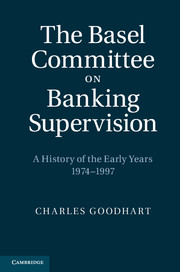Book contents
- Frontmatter
- Contents
- Figures
- Tables
- Foreword
- Preface
- 1 Introduction
- 2 The antecedents of the BCBS
- 3 Modus operandi
- 4 The Concordat
- 5 External and foreign exchange issues
- 6 Capital adequacy and the Basel Accord of 1988
- 7 The Market Risk Amendment
- 8 The Core Principles of Banking Supervision
- 9 Liquidity
- 10 Off-balance-sheet exposures and derivatives
- 11 Other topics addressed by the BCBS
- 12 The relationship of the BCBS with banks and other banking regulators
- 13 Relationships with other non-bank oversight and supervisory bodies
- 14 The legal position of the BCBS
- 15 The international relations of the BCBS
- 16 The BCBS and the social sciences
- 17 Epilogue
- Bibliography
- Index
5 - External and foreign exchange issues
Published online by Cambridge University Press: 07 September 2011
- Frontmatter
- Contents
- Figures
- Tables
- Foreword
- Preface
- 1 Introduction
- 2 The antecedents of the BCBS
- 3 Modus operandi
- 4 The Concordat
- 5 External and foreign exchange issues
- 6 Capital adequacy and the Basel Accord of 1988
- 7 The Market Risk Amendment
- 8 The Core Principles of Banking Supervision
- 9 Liquidity
- 10 Off-balance-sheet exposures and derivatives
- 11 Other topics addressed by the BCBS
- 12 The relationship of the BCBS with banks and other banking regulators
- 13 Relationships with other non-bank oversight and supervisory bodies
- 14 The legal position of the BCBS
- 15 The international relations of the BCBS
- 16 The BCBS and the social sciences
- 17 Epilogue
- Bibliography
- Index
Summary
An early warning system?
As already discussed in Chapter 2, the concerns that were uppermost in the minds of the G10 governors when they established the BCBS in the autumn of 1974 related to the Herstatt collapse, the resulting turmoil in foreign exchange markets and the sustainability of international capital flows (rather than the home/host supervisory issues that had been the focus of the work of the Groupe de Contact). This is clear from the initial mandate that the Governors gave the Committee, as follows:
The Governors of the Group of Ten, at their [1974] December meeting at the Bank for International Settlements, discussed the problems of assuring the solvency and liquidity of banks, basing themselves on a summary report prepared by the BIS on existing regulations and supervisory practices. To carry further the work in this field and to prepare for future discussions among themselves, the Governors decided to establish a new committee to be made up of two experts from each country, one from the supervisory and one from the foreign exchange side. The committee will take as its starting point the BIS summary report and will give particular attention to the need for an early warning system. It was noted that from this point of view the quality of supervision is at least as important as the regulations themselves.
So, the one specific task that the BCBS was asked to undertake was to explore the possibility of an early warning system (EWS) for international financial crises. The Committee turned to this immediately: it was on the agenda for all five meetings in their first year (1975). Despite the fact that the BCBS had been invited to act on establishing an EWS, the members soon discovered, in their discussions, that they were unwilling to do so.
- Type
- Chapter
- Information
- The Basel Committee on Banking SupervisionA History of the Early Years 1974–1997, pp. 127 - 145Publisher: Cambridge University PressPrint publication year: 2011



